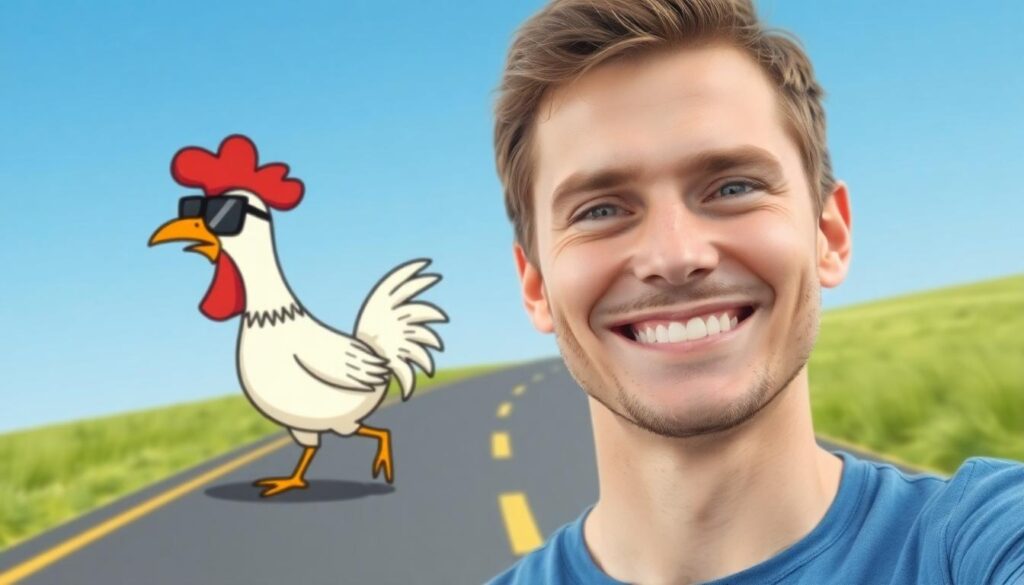Ever wondered why those “why did the chicken cross the road” jokes never get old? We’ve all chuckled at these simple one-liners since childhood, yet they continue to evolve with clever twists and unexpected punchlines that keep us coming back for more.
In our collection of the funniest across-the-road jokes, we’ll explore how this classic joke format has stood the test of time while adapting to modern humor. From the original chicken to politicians, celebrities, and even inanimate objects—everything seems to be crossing roads these days for hilariously different reasons.
Why Across the Road Jokes Have Endured Through Generations
Across the road jokes have maintained their popularity for generations because of their simple yet versatile format. We’ve observed how these jokes work on multiple levels, appealing to both children and adults with their adaptable punchlines. Their universality crosses cultural boundaries, as the basic premise requires no special knowledge or context to understand.
The psychological appeal of these jokes lies in their perfect combination of expectation and surprise. People anticipate a profound reason for crossing the road but are instead met with an anticlimactic or absurd answer that triggers laughter. This subversion of expectations has kept the joke format fresh for decades.
The joke’s adaptability to current events and pop culture has ensured its continued relevance. When celebrities, politicians, or trending topics become the subject of these jokes, they create an immediate connection with contemporary audiences. These topical variations breathe new life into the classic format, making it feel perpetually modern.
Their simplicity makes across the road jokes incredibly memorable and shareable. The basic template is easy to remember and repeat, allowing them to spread through word of mouth across generations before social media existed. Now, these jokes travel even faster online, reaching global audiences within minutes.
The communal aspect of these jokes fosters social bonding. Sharing a chicken joke often encourages others to contribute their own versions, creating a playful exchange that strengthens relationships. This collaborative humor creates positive associations with the joke format, ensuring its continued transmission to new audiences.
10 Classic Chicken Crossing the Road Jokes That Never Get Old
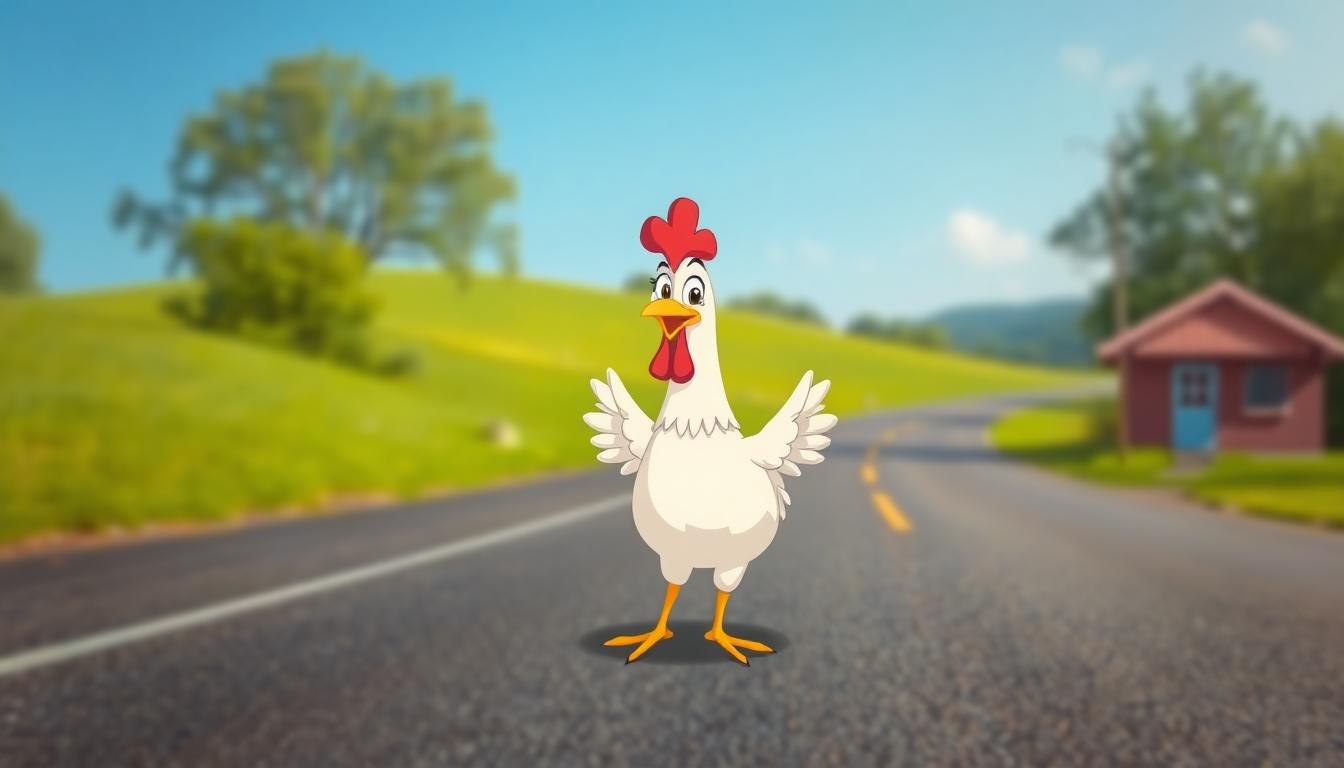
The Original Chicken Joke: “To Get to the Other Side”
The joke that started it all first appeared in print in 1847 in The Knickerbocker magazine. Its original punchline, “Because it wants to get on the other side!” has since been simplified to the version we all know today. This classic became wildly popular in the 1840s through minstrel shows, where comedic characters like Tambo and Bones would use it in their routines. What makes this joke so enduring is its anti-humor structure—it builds anticipation for a clever punchline but delivers a surprisingly literal answer instead.
The Mathematician’s Chicken Joke
“Why did the chicken cross the road? To prove the path was a geodesic in Euclidean space.” This academic spin transforms the simple farm animal scenario into a complex mathematical proposition. Mathematicians love this version because it playfully applies advanced geometric concepts to a mundane situation. The contrast between the simplicity of a chicken crossing a road and the complexity of geodesic paths creates an unexpected intellectual twist that appeals particularly to those with mathematical backgrounds.
The Possum Rivalry Joke
“Why did the chicken cross the road? To prove to the possum that it could be done.” This variation introduces a competitive element between two animals. Possums, known for their tendency to freeze or play dead in dangerous situations, serve as the perfect foil to the brave chicken. The joke implies a dare or challenge between the animals, adding a layer of personality and motivation that goes beyond the original punchline.
The Colonel Sanders Escape Plan
“Why did the chicken cross the road? To escape Colonel Sanders.” This darkly humorous version plays on the well-known association between chickens and KFC’s founder. The joke works on multiple levels, giving the chicken a legitimate survival motivation for crossing the road. This punchline transforms the innocent original joke into a commentary on the chicken’s awareness of its potential fate, adding an unexpectedly sophisticated layer to the simple format.
The Classic Pun Version
“Why did the chicken cross the road? Because it would be a fowl proceeding.” Dating back to the mid-1800s, this version relies on the homophone between “foul” and “fowl.” Wordplay jokes like this were particularly popular in 19th-century humor, showing how the chicken joke quickly evolved beyond its anti-humor origins. This pun-based approach demonstrates the joke’s versatility as a vehicle for different types of comedy.
The Hen Party Invitation
“Why did the chicken cross the road? To get to the hen party.” This equestrian twist creates a double meaning by playing on “hen party” (a gathering of female chickens and a pre-wedding celebration). The joke works by giving the chicken a social motivation that feels both logical and absurd simultaneously. Its clever wordplay makes it one of the more sophisticated variations in the chicken joke canon.
The Cooped-Up Chicken
“Why did the chicken cross the road? Because it was tired of being cooped up.” This version uses a direct pun on chicken coops, giving the chicken a relatable motivation—the desire for freedom. The joke works by anthropomorphizing the chicken with human emotions like boredom and restlessness. Its success lies in creating sympathy for the chicken while still maintaining the joke’s familiar structure.
The Playground Slide Variation
“Why did the chicken cross the playground? To get to the other slide.” This clever adaptation shifts the location from a road to a playground, creating an unexpected twist on the familiar formula. The punchline uses the near-homophone between “side” and “slide” to create a satisfying wordplay. This variation shows how versatile the joke format can be when slightly modified.
The Revolutionary Chicken
“Why did the chicken cross the road? Because it was a revolutionary act.” Often used in political contexts, this version elevates the simple action to a statement of rebellion. The humor comes from applying grand political philosophy to a chicken’s mundane decision. This variation demonstrates how the chicken joke can be adapted to comment on serious topics while maintaining its inherently silly nature.
The Scientific Explanation
“Why did the chicken cross the road? To maintain its momentum according to Newton’s First Law of Motion.” This scientific parody applies physics principles to explain the chicken’s behavior. Academic humor often uses overly technical explanations for simple phenomena, and this chicken joke variation perfectly captures that approach. The contrast between the simplicity of the question and the complexity of the answer creates the perfect comic tension.
8 Hilarious Animal Variations of the Road-Crossing Format
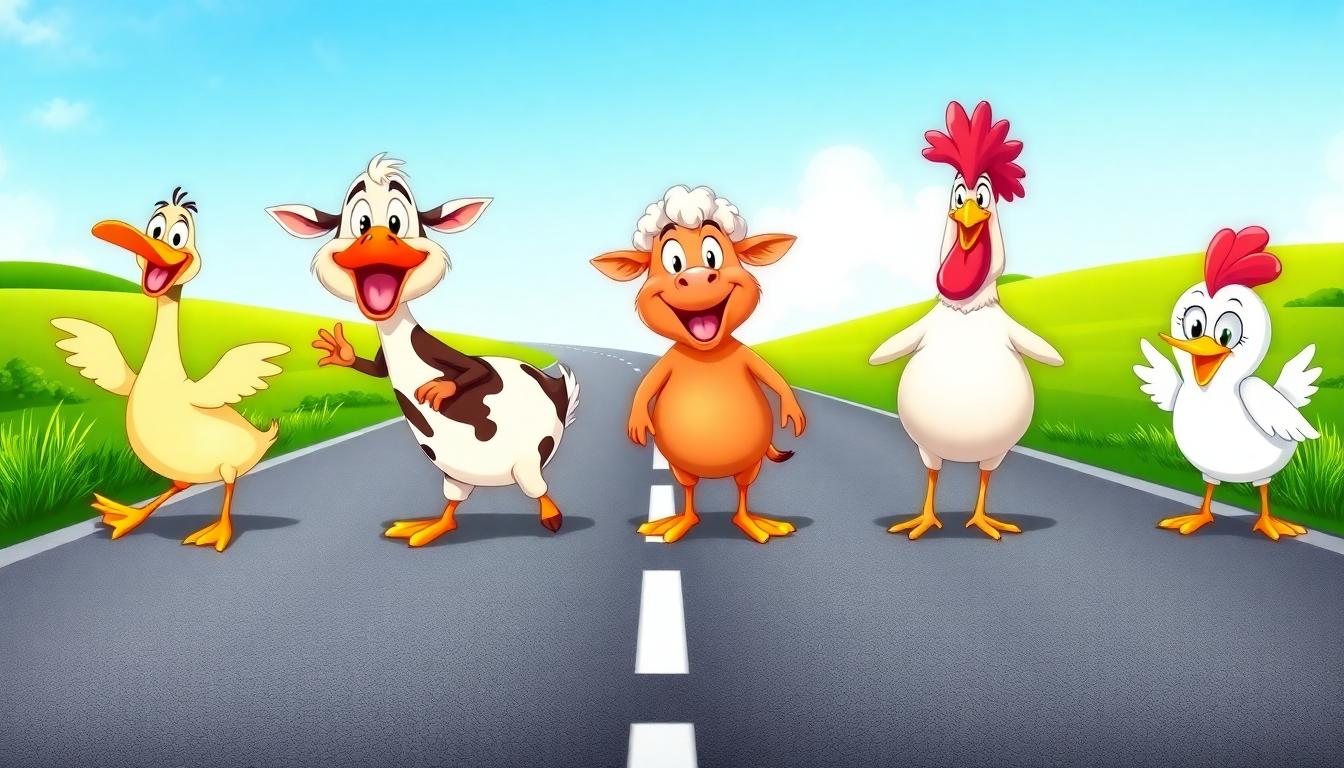
The classic chicken joke has evolved to include various animals, each bringing their unique personality and pun opportunities to the format. We’ve collected some of the funniest animal-based road-crossing jokes that cleverly adapt the timeless setup.
Why Did the Duck Cross the Road?
Ducks have waddled their way into the road-crossing joke format with delightful results. While exact duck punchlines aren’t as widely documented as their chicken counterparts, these waterfowl often feature in regional variations of the classic joke. Duck-based punchlines typically incorporate clever wordplay related to their distinctive traits. Many spontaneous adaptations exist, showing the flexibility of this joke format with different animals. Though not officially documented, variations like “to get to the quack of dawn” demonstrate how duck characteristics can be turned into humor.
When Cows, Sheep, and Other Farm Animals Cross Roads
Farm animals provide rich material for road-crossing joke variations, with cows leading the herd in popularity. The classic “Why did the cow cross the road?” is typically answered with “To get to the moo-vies,” showcasing the simple but effective pun structure these jokes often follow. Turkeys offer a meta-humor approach with the punchline “To prove he wasn’t a chicken!” – cleverly referencing the original joke while playing on the expression of being afraid.
Hedgehogs bring dark humor to the format with “To see his flat mate!” – a grim but funny nod to roadkill scenarios. The armadillo appears in a meta-punchline where the chicken crosses “To show the armadillo it was possible,” creating a layered joke that comments on the armadillo’s frequent roadkill status.
Rubber chickens add absurdist humor with “To stretch her legs,” while baby chicks reference family dynamics with “Because it was ‘take your child to work day.'” Even clowns get involved, crossing the road “To get his rubber chicken,” creating a circular reference that connects multiple joke elements.
Farm animal jokes typically rely heavily on puns and wordplay exact to animal sounds or characteristics. Cows get “moo-vies” and chickens become “poultry in motion,” demonstrating how the simple formula adapts to each animal’s unique traits. The core structure remains consistent: “Why did [animal] cross the road?” followed by a punchline that either delivers a clever pun or subverts expectations by commenting on the joke format itself.
7 Across the Road Jokes That Use Clever Wordplay
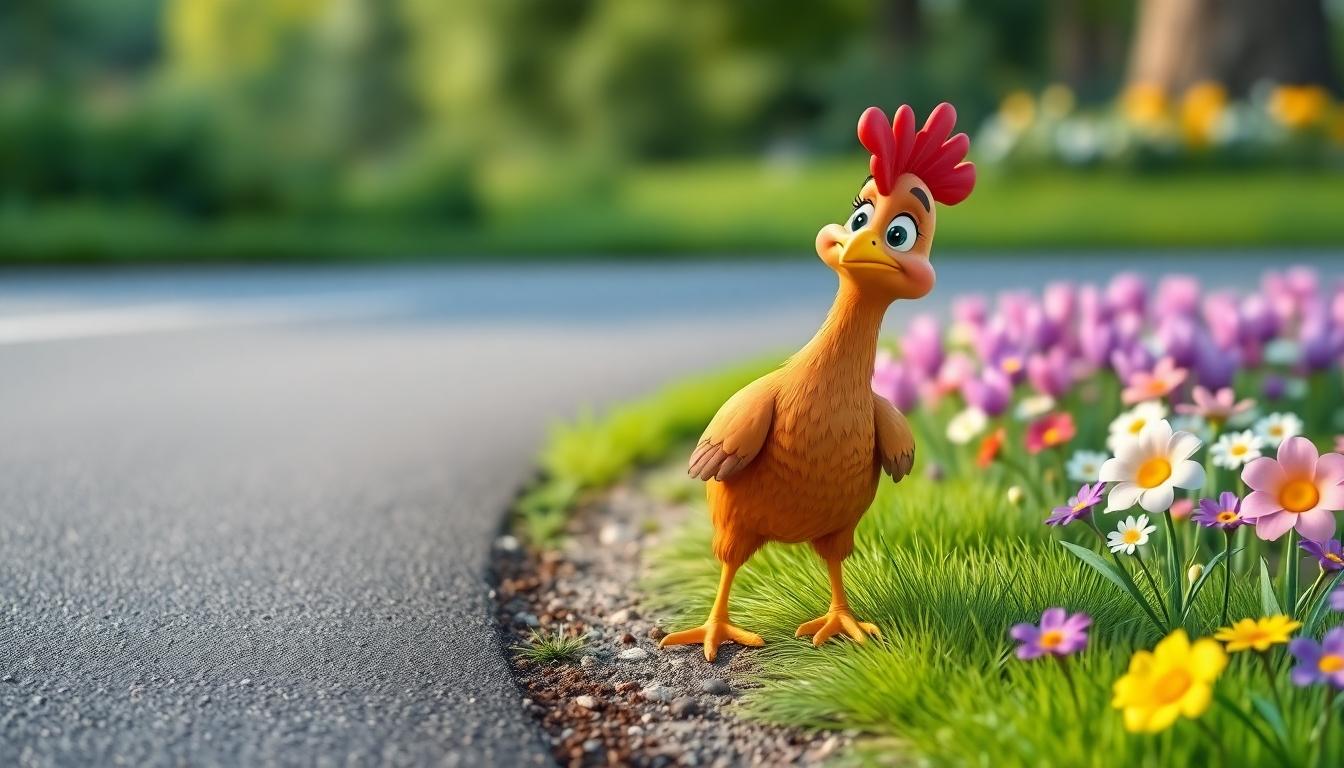
Puns and Double Meanings in Road-Crossing Humor
Wordplay brings a delightful twist to the classic road-crossing joke format, elevating simple humor into clever linguistic treats. These jokes rely on puns, double meanings, and creative language manipulation to deliver unexpected punchlines that make us smile. Here are some of our favorite examples that showcase this verbal creativity:
- Why did the chicken cross the road? To get to the udder side. This clever play substitutes “other” with “udder,” a cow body part, creating an unexpected agricultural connection.
- What do you call a chicken that crosses the road? Poultry in motion. The joke combines “poultry” with the phrase “poetry in motion,” creating a perfect description for a road-crossing chicken.
- Why did the rubber chicken cross the road? To stretch its legs. This pun works on multiple levels, as rubber items stretch literally, while living creatures figuratively “stretch their legs” during exercise.
- Why did the chicken cross the road halfway? She wanted to get to the other side later. The humor comes from subverting expectations about completing the journey, giving a procrastinator’s twist to the classic formula.
- Why did the chicken say to the road? You’re egg-sactly what I needed. By replacing “exactly” with “egg-sactly,” this joke incorporates the chicken’s role as an egg-layer into the wordplay.
- Why did the chicken go to the other side? To avoid a poultry-geist. This creative pun transforms “poltergeist” (a ghost) into “poultry-geist,” suggesting the chicken is fleeing from a haunting exact to fowl.
- Why did the chicken cross the road? Just beak-cause he could. The substitution of “because” with “beak-cause” incorporates the chicken’s physical features directly into the punchline.
When the Joke’s Punchline Is a Play on Words
The magic of these road-crossing jokes lies in their linguistic creativity and how they transform ordinary phrases into humorous punchlines. Each joke uses different wordplay techniques to achieve its comedic effect. Some rely on homophone substitution, replacing words with similar-sounding alternatives like “udder” for “other” or “beak-cause” for “because.” Others create compound words by combining chicken-related terms with existing phrases, as seen in “poultry-geist.”
Many of these jokes work because they connect directly to the animal’s physical characteristics or behaviors. The rubber chicken “stretching its legs” plays with our understanding of both rubber properties and common expressions. The “egg-sactly” pun directly references the chicken’s biological function as an egg producer.
What makes these jokes particularly effective is how they maintain the familiar structure of the road-crossing format while introducing unexpected linguistic twists. They satisfy our brain’s love for pattern recognition while simultaneously surprising us with clever language manipulation. The punchlines reward attentive listeners who appreciate the subtle connections between the chicken’s journey and the verbal gymnastics that give these jokes their distinctive charm.
6 Across the Road Jokes That Reference Pop Culture
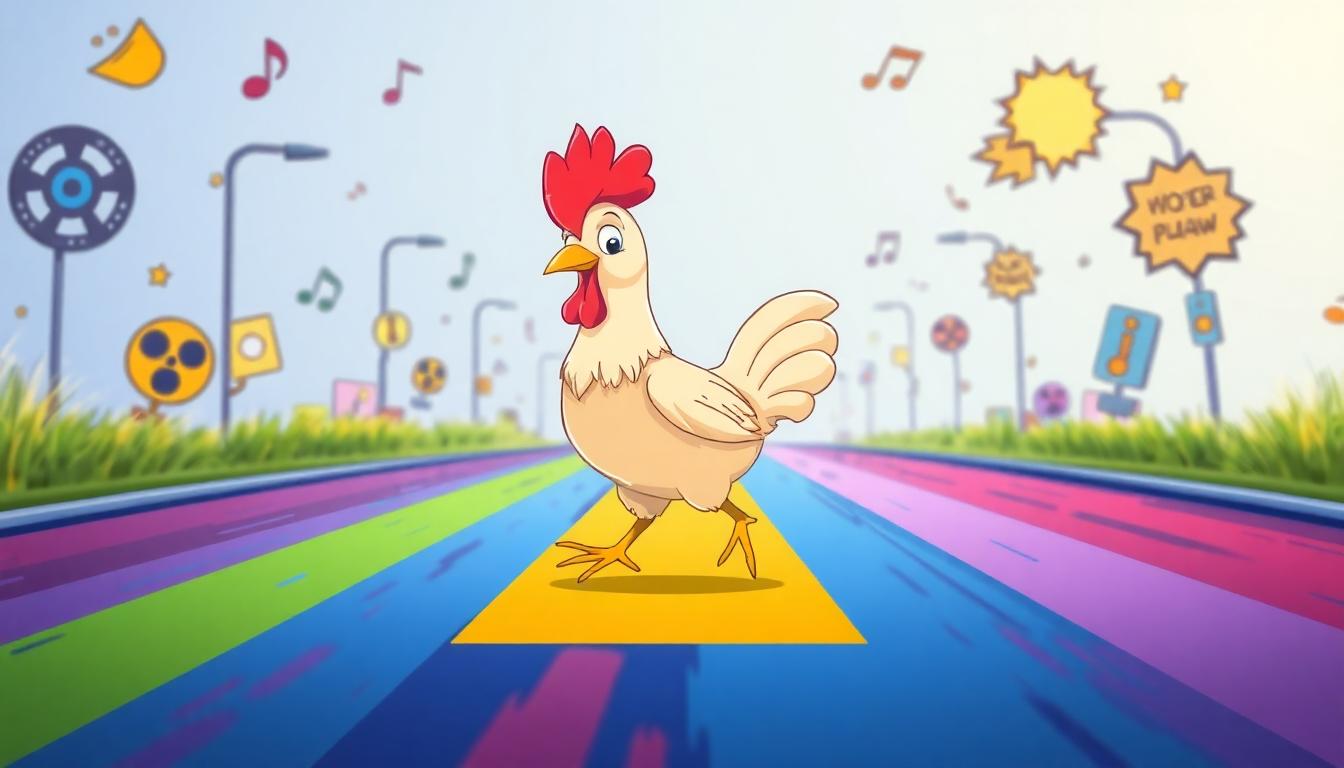
While the classic chicken road joke format has endured for generations, it’s also adapted to include references from our modern entertainment industry. These pop culture variations add fresh layers to the timeless format by incorporating celebrities, movies, and TV shows.
Celebrity-Themed Road-Crossing Jokes
Celebrity-inspired road-crossing jokes are less common than other variations, but they still offer amusing takes on the classic format. Some jokes incorporate broad cultural themes rather than exact celebrities. One popular example plays on American values: “Why did the chicken cross the road? Because this is AMERICA! It can go anywhere it wants!” This patriotic spin celebrates cultural ideals of freedom while maintaining the joke’s familiar structure. Other celebrity variations might reference famous personalities’ catchphrases or well-known traits, though these tend to circulate more in oral traditions than in documented collections.
Movie and TV Show Variations
Films and television shows provide rich material for road-crossing joke adaptations. “Why did Chicken Little cross the road? To warn the people on the other side that the sky was falling!” This clever variation references the animated character’s famous panic about impending doom. Another example draws from circus-themed entertainment: “What caused the chicken to cross the road and enter the circus? To learn how to juggle.” Some jokes take a meta approach, breaking the fourth wall with punchlines like “To get to the punchline on the other side,” which cleverly comments on the joke format itself. Animal-themed variants also play with character relationships, such as “Why did the turkey cross the road? To prove he wasn’t a chicken!” – using the rivalry between different fowl for comedic effect.
Traditional formats continue to dominate over exact franchise references, with few documented examples directly tying into modern properties like Marvel or Star Wars. Most pop culture variations likely exist in casual conversations or social media posts rather than in indexed humor collections. The self-referential nature of many of these jokes demonstrates how the format continues to evolve while maintaining its recognizable structure.
5 Philosophical “Why Did They Cross the Road?” Jokes
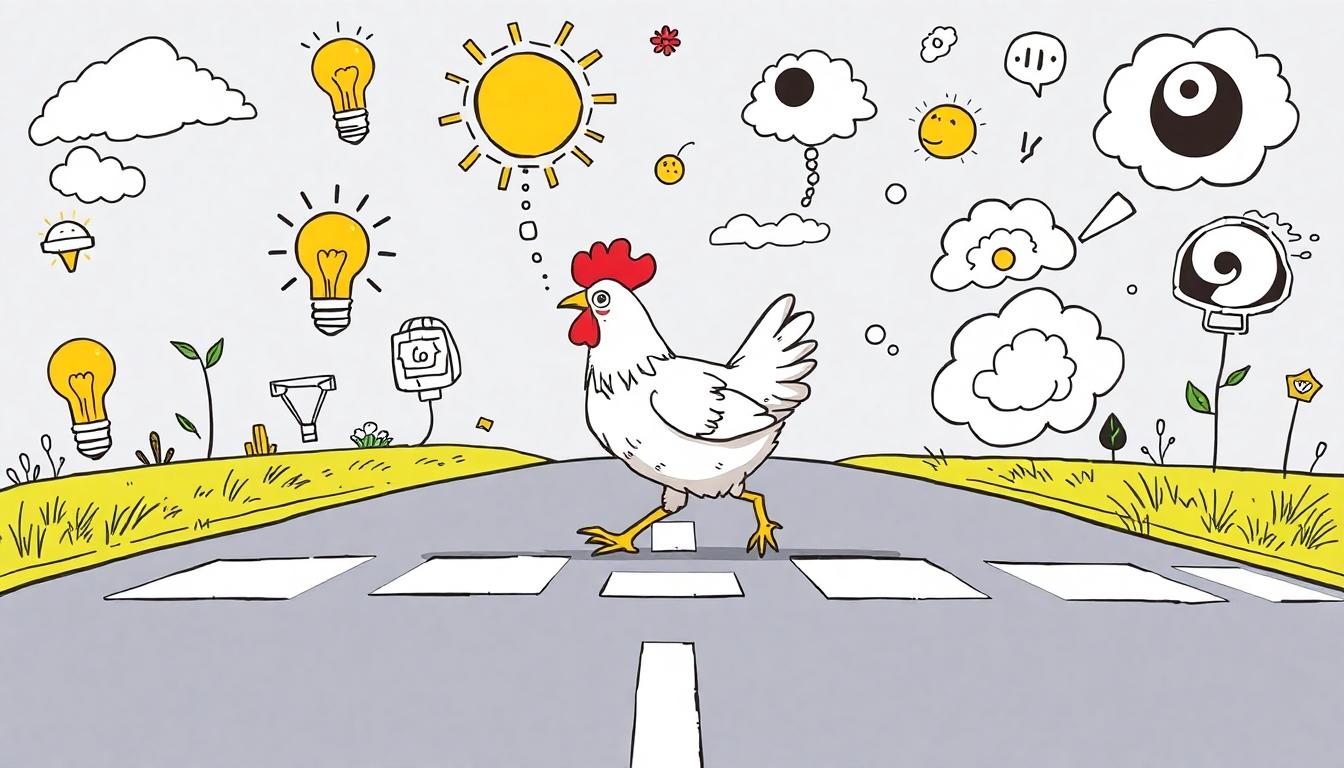
Philosophy and humor make an unexpectedly perfect pair, especially when applied to the classic road-crossing format. Here are five philosophical takes that transform this simple joke into profound contemplations:
- Albert Einstein: “Whether the chicken crossed the road or the road crossed the chicken depends upon your frame of reference.” This clever twist highlights Einstein’s theory of relativity, showing how perspective changes everything.
- Buddha: “If you ask this question, you deny your own chicken-nature.” The Buddhist perspective reminds us that separation between beings is illusory—a humorous nod to non-dualistic thinking.
- Jean-Paul Sartre: “To act in good faith and be true to itself, the chicken found it necessary to cross the road.” Sartre’s existentialist view emphasizes authentic choice and personal responsibility in even the simplest actions.
- William Blake: “To see heaven in a wild fowl.” This poetic response references Blake’s vision of seeing “the industry in a grain of sand,” applying transcendental thinking to our feathered friend’s journey.
- Zeno: “To prove it could never reach the other side.” This punchline cleverly references Zeno’s paradox about infinite divisibility, suggesting the chicken’s journey is theoretically impossible.
Existential Road-Crossing Humor
Existential humor thrives on finding meaning (or lack thereof) in everyday actions like crossing roads. The absurdity highlighted in these jokes reflects key existentialist themes of freedom, choice, and the search for purpose in a potentially meaningless universe. Sartre’s chicken joke perfectly captures this essence, suggesting that crossing the road becomes an authentic act of self-determination. The humble chicken, by making this crossing choice, engages in exactly the kind of freedom existentialists celebrate—choosing its own path even though the inherent absurdity of existence.
When Philosophers Become the Subject of the Joke
Philosophers often find themselves becoming the punchline, with their complex ideas transformed into clever quips that highlight contradictions in their thinking. Plato crosses “for the greater good,” a lighthearted jab at his concept of ideal forms and societal structure. Wittgenstein jokes take on a darker humor, such as becoming “the late Wittgenstein”—playing on both his later philosophical period and his mortality. Heraclitus, famous for stating “no man steps in the same river twice,” ironically “fell in the same river twice” in his joke version, perfectly contradicting his philosophy of constant change. These witty adaptations demonstrate how philosophical concepts can be playfully subverted through humor, making complex ideas accessible while gently poking fun at the thinkers who developed them.
How to Create Your Own Across the Road Jokes
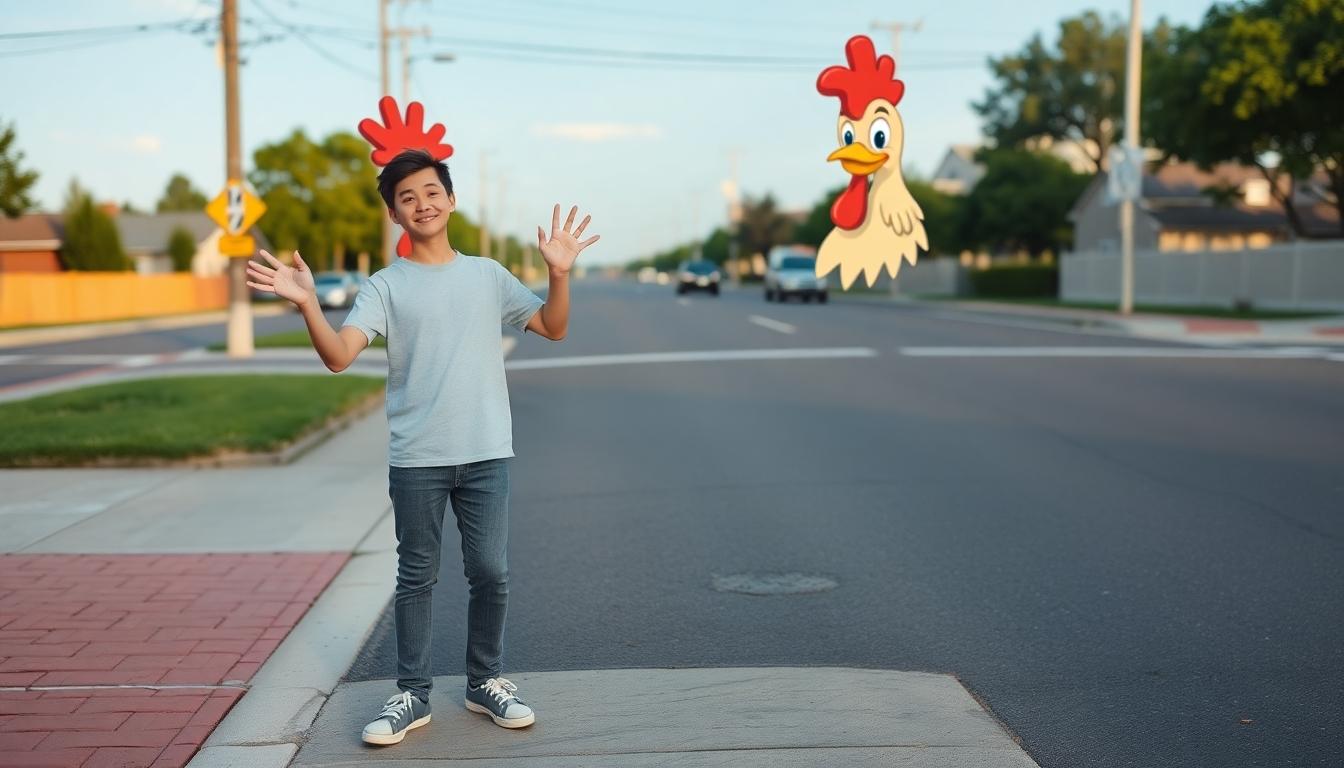
Understanding the Format
The classic “across the road” joke follows a simple question-and-answer format that’s easy to replicate. Starting with “Why did the [subject] cross the road?” sets up an expectation for the punchline. This format, dating back to 1847 when it first appeared in The Knickerbocker magazine, creates a perfect setup for humor through its familiar structure.
Playing with Expectations
Creating effective road-crossing jokes requires setting up expectations only to cleverly subvert them. Begin with the standard question format but deliver an unexpected answer that catches listeners off guard. The original joke works precisely because the answer “To get to the other side” is simultaneously obvious and disappointing, creating that signature anti-humor effect that’s become iconic.
Using Wordplay and Puns
Puns elevate simple road-crossing jokes to memorable gems. Try incorporating wordplay related to your chosen subject’s characteristics or stereotypes. For chickens, phrases like “a fowl proceeding” create humor through double meanings. Your punchlines become more entertaining when they connect to inherent qualities of your joke’s subject.
Incorporating Stereotypes and Associations
Successful jokes often play on well-known stereotypes or common associations. Colonel Sanders references work well in chicken jokes because the connection is immediately recognizable to most audiences. Consider what your chosen subject is famous for, then create a punchline that cleverly references this association to create instant recognition and humor.
Customizing for Different Subjects
Beyond chickens, almost any animal, object, or person can star in your road-crossing joke. Animals bring built-in characteristics perfect for punchlines – ducks can “bill” someone, sheep might cross for “shear” enjoyment. Celebrity versions work well when they reference well-known traits or catchphrases. The versatility of this joke format allows for endless creative possibilities.
Testing Your Joke
The best jokes evolve through testing and refinement. Share your creations with friends to gauge reactions and adjust accordingly. Remember that timing and delivery significantly impact how well your joke lands. Sometimes minor wording adjustments can transform an average joke into a laugh-out-loud moment that others will want to share.
Why Across the Road Jokes Work as Ice Breakers

Universal Familiarity
Across the road jokes work exceptionally well as ice breakers because virtually everyone recognizes them. These jokes create an instant connection through shared cultural knowledge, eliminating awkward silences in new social situations. Most people have heard “Why did the chicken cross the road?” at some point in their lives, making it a universal reference point that requires no explanation. This familiarity provides a comfortable starting point for conversation, especially when meeting new people or addressing a group.
Transcending Boundaries
These jokes effortlessly cross cultural and generational divides, making them perfect for diverse settings. Children understand them just as easily as adults, and they typically don’t rely on cultural references that might be lost on international audiences. Their simple structure makes them accessible to nearly everyone, regardless of background or age. We’ve found that even in multilingual environments, the basic concept translates well, creating a shared moment of understanding among people from different backgrounds.
Creating a Relaxed Atmosphere
The lighthearted and playful nature of across the road jokes instantly diffuses tension in social settings. Their simplicity and often absurd punchlines signal that the conversation is casual rather than serious. When someone opens with “Why did the chicken cross the road?” participants immediately understand they’re entering a playful exchange rather than a formal discussion. This signals to everyone that it’s okay to relax and enjoy the interaction without pressure.
Encouraging Participation
These jokes naturally invite others to join in with their own variations or responses. After hearing the classic chicken joke, people often feel compelled to share their favorite twist or create a new one on the spot. The familiar format—”Why did X cross the road?”—provides a template that anyone can easily adapt, fostering active participation. Their accessibility makes them particularly effective for encouraging shy or reserved individuals to contribute to the conversation.
Versatility in Application
Across the road jokes can be customized to fit exact audiences or situations, making them remarkably versatile ice breakers. For business meetings, you might ask, “Why did the entrepreneur cross the road?” For academic settings, “Why did the professor cross the road?” might be more appropriate. The classic format can incorporate references relevant to the particular group, creating an immediate sense of insider connection. This adaptability ensures they remain fresh and contextually appropriate for any gathering.
Notable Examples That Work Well
The classic “Why did the chicken cross the road? To get to the other side” works precisely because of its anti-humor structure—it sets up expectations for a clever punchline but delivers a straightforward answer instead. Other effective variations include “Why did the chicken cross the road? To prove to the possum it could be done,” which introduces a competitive element that often sparks laughter. More topical versions like “Why did the chicken cross the road? To escape Colonel Sanders” work because they add a layer of narrative and character to the simple joke format.
The Cultural Impact of Road-Crossing Joke Templates
Road-crossing jokes have cemented their place in our global humor lexicon for good reason. They’ve transcended their humble beginnings to become a versatile template for comedy that adapts effortlessly to our changing industry.
From philosophical ponderings to pop culture references these jokes continue to evolve while maintaining their core appeal. Their simplicity makes them universal while their flexibility allows for endless creative variations.
We hope this collection has sparked your creativity and brought a few smiles. Whether you’re using them as ice breakers or crafting your own variations you’re now part of a long tradition that keeps this timeless joke format alive. The road to great humor isn’t just for chickens anymore—it’s for everyone with a good punchline to share.
Frequently Asked Questions
What is the origin of the “why did the chicken cross the road” joke?
The original “why did the chicken cross the road” joke dates back to 1847, featuring an anti-humor structure where the punchline is deliberately mundane. Its simplicity and unexpected plainness established a format that would be adapted countless times over generations, making it one of the most recognizable joke structures in history.
Why have chicken road-crossing jokes remained popular for so long?
These jokes have endured because of their simple yet versatile format that appeals to all ages and crosses cultural boundaries. They combine expectation with surprise, are easily adaptable to current events, and are highly shareable. The communal aspect of telling these jokes also fosters social bonding, ensuring they continue to be passed down through generations.
How can I create my own road-crossing joke?
To create your own joke, start with the classic “Why did X cross the road?” format, then craft an unexpected punchline that plays with audience expectations. Incorporate wordplay, puns, or stereotypes associated with your subject. Test your joke with friends and refine it based on their reactions. The format’s versatility allows for endless creative possibilities.
What makes philosophical versions of the chicken joke different?
Philosophical chicken jokes pair humor with profound contemplation, transforming the simple format into reflections on existence, perspective, and choice. They often mimic the thinking styles of famous philosophers like Einstein, Buddha, or Sartre, making complex ideas more accessible while maintaining the joke’s familiar structure.
Why do road-crossing jokes work well as ice breakers?
These jokes work as excellent ice breakers because of their universal familiarity and lighthearted nature. They create instant connections, diffuse tension in social situations, and encourage participation. Their adaptability allows them to be customized for specific contexts, making them relevant and engaging for diverse audiences.
Are there variations beyond chickens crossing roads?
Absolutely! The format has expanded to include other animals (ducks, cows, sheep), celebrities, politicians, and even inanimate objects. Each variation brings unique characteristics and pun opportunities to the classic setup, demonstrating the joke format’s remarkable adaptability and staying power.
How have pop culture references influenced road-crossing jokes?
Pop culture has significantly expanded the joke format by incorporating references to movies, TV shows, and celebrities. These variations connect with contemporary audiences by referencing familiar characters and narratives while maintaining the recognizable structure. This adaptability ensures the humor continues to resonate with new generations.
What psychological factors make these jokes funny?
The psychological appeal lies in the combination of expectation and surprise. Audiences anticipate a profound reason for crossing the road but are met with absurd or mundane answers that trigger laughter. This subversion of expectations, combined with the joke’s simplicity, creates a satisfying cognitive release that makes the humor effective.

